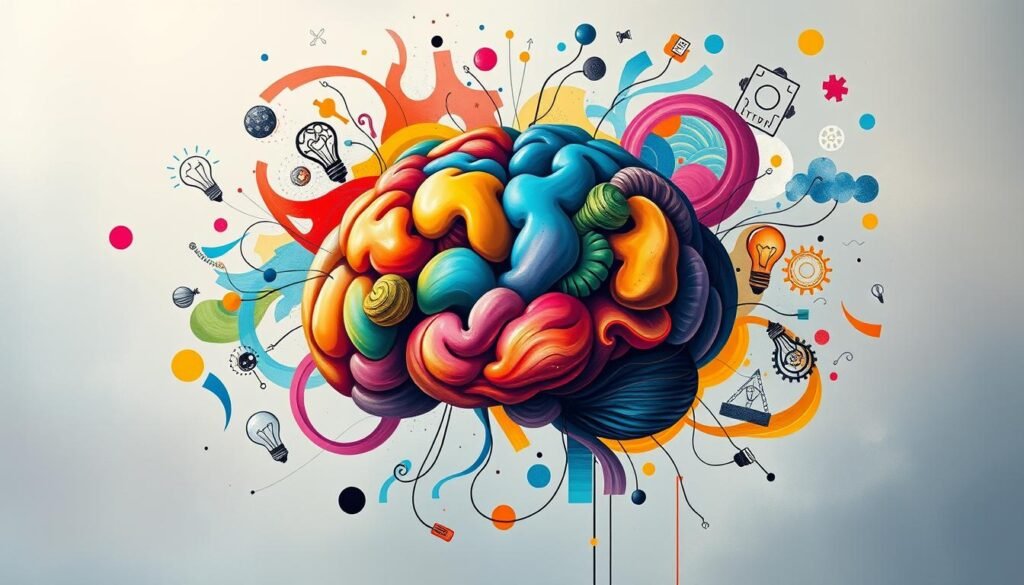In today’s fast-paced world, the ability to maintain a sharp and agile mind is more important than ever. Cognitive training, a burgeoning field of brain exercises and mental fitness techniques, offers a compelling solution to enhance our mental capabilities. This approach has gained significant traction as individuals and organizations alike recognize the benefits of proactively sharpening their cognitive skills.
At the core of cognitive training lies the principle of neuroplasticity – the brain’s remarkable ability to adapt and change over time. By engaging in targeted brain exercises, we can stimulate the growth and connections of our neural pathways, leading to improved memory, enhanced focus, and increased problem-solving abilities. This holistic approach to brain health is revolutionizing the way we think about mental performance and longevity.
Key Takeaways
- Cognitive training is a proven method to enhance mental capabilities and brain health
- It leverages the brain’s neuroplasticity to improve memory, focus, and problem-solving skills
- Cognitive training programs offer a diverse range of brain exercises and activities
- Regular practice and a commitment to cognitive training can lead to tangible cognitive benefits
- Integrating cognitive training with other healthy lifestyle choices can maximize its effectiveness
What is Cognitive Training?
Cognitive training, also known as neuroplasticity training, is a structured program designed to enhance various mental capabilities, including memory, attention, problem-solving, and critical thinking. The primary purpose of cognitive training is to stimulate the brain and promote neuroplasticity, the brain’s ability to reorganize and adapt in response to new experiences and challenges.
Definition and Purpose
Cognitive training can be defined as a set of evidence-based exercises and activities that target specific cognitive functions. The goal of cognitive training is to improve overall cognitive performance, potentially leading to enhanced cognitive enhancement and better problem-solving skills.
Key Components
The key components of cognitive training typically include:
- Memory exercises, such as recalling sequences or storing and retrieving information
- Attention tasks, which focus on improving focus, concentration, and the ability to filter out distractions
- Reasoning challenges, which involve problem-solving, logical thinking, and decision-making abilities
Types of Cognitive Training
Cognitive training can take various forms, including:
- Computer-based programs: Interactive software and mobile apps that provide personalized cognitive exercises and tasks
- Traditional puzzles and games: Engaging activities like crosswords, sudoku, and brain teasers that challenge cognitive skills
- Targeted exercises: Specific activities designed to improve specific cognitive functions, such as memory recall or spatial reasoning
Regardless of the format, the underlying goal of cognitive training is to stimulate the brain and promote neuroplasticity, ultimately leading to improved cognitive performance and enhanced mental capabilities.
Benefits of Cognitive Training
Cognitive training has been shown to offer a wide range of benefits that can positively impact various aspects of our lives. From enhanced memory retention to improved focus and problem-solving skills, the advantages of engaging in cognitive exercises are both measurable and far-reaching.
Enhanced Memory
One of the primary benefits of cognitive training is its ability to improve memory. Through targeted brain exercises, individuals can strengthen their capacity to recall information, remember names and faces, and retain important details. This enhancement in memory function can translate to greater academic or professional success, as well as a heightened sense of confidence and accomplishment in daily tasks.
Improved Focus
Cognitive training has also been linked to enhanced focus and concentration. By challenging the brain with activities that require sustained attention, individuals can train their minds to stay on task for longer periods, minimizing distractions and improving productivity. This improved focus can be particularly beneficial in fast-paced work environments or during complex problem-solving scenarios.
Increased Problem-Solving Skills
Cognitive training exercises often involve the use of critical thinking and problem-solving skills, which can translate to tangible improvements in an individual’s ability to tackle complex issues. By regularly engaging in brain-stimulating activities, individuals can develop more agile and adaptable problem-solving strategies, allowing them to approach challenges with greater creativity and effectiveness.
The benefits of cognitive training are vast and varied, with the potential to positively impact memory improvement, attention training, and overall mental performance. By incorporating these brain-boosting exercises into their daily routines, individuals can unlock their full cognitive potential and enhance their ability to navigate the demands of modern life.
How Cognitive Training Works
Cognitive training is a fascinating field that harnesses the brain’s remarkable ability to adapt and change, known as neuroplasticity. This process allows the brain to reorganize and form new neural pathways, enabling cognitive enhancement through targeted training exercises.
Brain Plasticity
At the heart of cognitive training lies the concept of brain plasticity. The brain is not a static organ; it can continuously reorganize and adapt in response to various stimuli, including the challenges presented during cognitive training activities. This neuroplasticity allows the brain to strengthen existing connections and forge new ones, leading to improved cognitive abilities.
Neurotransmitters Involvement
Cognitive training triggers the release of key neurotransmitters, such as dopamine, norepinephrine, and acetylcholine, which play a crucial role in cognitive processes. These neurotransmitters enhance focus, memory, and learning, amplifying the effects of neuroplasticity training and cognitive enhancement.
Learning Mechanisms
Cognitive training relies on well-established learning mechanisms, such as repetition, feedback, and active engagement. By repeatedly practicing cognitive exercises, the brain forms new neural pathways and strengthens existing connections, leading to lasting improvements in cognitive function. The feedback provided during training further reinforces these learning processes, helping the brain adapt and optimize its performance.
In summary, the science behind cognitive training is rooted in the brain’s remarkable ability to adapt and change. By harnessing the power of neuroplasticity, targeted exercises, and the involvement of key neurotransmitters, cognitive training can unlock the full potential of the human mind, driving remarkable cognitive enhancement.
Popular Cognitive Training Programs
In the realm of brain exercises and mental fitness, several cognitive training programs have gained widespread recognition. These programs aim to enhance various cognitive abilities, from memory and focus to problem-solving skills. Let’s explore three of the most popular options: Lumosity, BrainHQ, and Elevate.
Lumosity
Lumosity is a well-known cognitive training platform that offers a suite of games and exercises designed to challenge and stimulate the brain. Launched in 2007, Lumosity has amassed a user base of over 100 million individuals worldwide. The program’s targeted exercises focus on improving memory, attention, processing speed, flexibility, and problem-solving skills. Lumosity’s adaptive algorithms ensure that the difficulty level adjusts to each user’s progress, providing a personalized training experience.
BrainHQ
BrainHQ, developed by Posit Science, is another comprehensive cognitive training program that has garnered attention from both users and scientific researchers. The platform offers a wide range of brain exercises and activities designed to enhance various cognitive domains, including memory, attention, speed of processing, and visual-spatial abilities. BrainHQ’s exercises are based on the principles of neuroplasticity, aiming to stimulate the brain and promote long-term cognitive improvements.
Elevate
Elevate is a mobile-based cognitive training app that has gained popularity for its user-friendly interface and personalized approach. Launched in 2014, Elevate focuses on improving core cognitive skills such as focus, memory, processing speed, math skills, and vocabulary. The app features a diverse selection of games and exercises tailored to individual user needs, with regular progress tracking and performance analytics to help users monitor their cognitive development.
While each of these cognitive training programs has its own unique features and target areas, they all share a common goal: to empower individuals to enhance their brain exercises and mental fitness through engaging, science-backed exercises and activities. As with any cognitive training program, it’s important to consider individual needs, preferences, and goals to determine the most suitable option.
Evidence Supporting Cognitive Training
The efficacy of cognitive training has been extensively studied and validated by scientific research. Numerous studies conducted by leading experts in the field have provided compelling evidence that cognitive enhancement and memory improvement can be achieved through targeted cognitive training programs.
Scientific Studies
A landmark study published in the Journal of the American Geriatrics Society found that older adults who engaged in cognitive training exercises demonstrated significant improvements in memory, reasoning, and processing speed, with benefits lasting up to 10 years after the initial training.
Another study, published in the Proceedings of the National Academy of Sciences, showed that cognitive training can lead to changes in brain structure and function, indicating the brain’s remarkable plasticity and ability to adapt and improve cognitive abilities.
Expert Opinions
Neuroscientists and psychologists have enthusiastically endorsed the use of cognitive training programs. Dr. Michael Merzenich, a leading expert in brain plasticity, has stated that “cognitive training can have a profound and lasting impact on an individual’s cognitive function, leading to meaningful improvements in daily life.”
“Cognitive training can have a profound and lasting impact on an individual’s cognitive function, leading to meaningful improvements in daily life.”
– Dr. Michael Merzenich, Neuroscientist
Real-World Applications
The benefits of cognitive training have been observed in various real-world settings. For example, a study conducted with employees at a Fortune 500 company found that those who engaged in cognitive training programs showed increased productivity, improved problem-solving skills, and enhanced memory performance in their daily work tasks.
| Study | Findings |
|---|---|
| Journal of the American Geriatrics Society | Older adults who engaged in cognitive training exercises demonstrated significant improvements in memory, reasoning, and processing speed, with benefits lasting up to 10 years. |
| Proceedings of the National Academy of Sciences | Cognitive training can lead to changes in brain structure and function, indicating the brain’s remarkable plasticity and ability to adapt and improve cognitive abilities. |
| Fortune 500 Company Study | Employees who engaged in cognitive training programs showed increased productivity, improved problem-solving skills, and enhanced memory performance in their daily work tasks. |
The overwhelming evidence from scientific studies, expert opinions, and real-world applications supports the significant benefits of cognitive training in enhancing memory, improving focus, and increasing problem-solving skills.
Age and Cognitive Training
As we age, our cognitive abilities can naturally decline. However, research suggests that cognitive training can play a vital role in maintaining and even enhancing our mental performance throughout different life stages.
Cognitive Aging
Cognitive aging is a natural process that can lead to gradual declines in areas such as memory, processing speed, and problem-solving skills. While some degree of cognitive decline is inevitable, executive function training and other cognitive enhancement techniques have been shown to potentially slow down this process and preserve cognitive function in older adults.
Training for Different Age Groups
- Children and adolescents: Cognitive training can help develop and strengthen foundational cognitive skills, leading to improved academic performance and better decision-making abilities.
- Working-age adults: Cognitive training can boost productivity, creativity, and problem-solving skills, ultimately enhancing executive function training and overall professional performance.
- Older adults: Cognitive training programs can help maintain mental sharpness, delay the onset of cognitive decline, and potentially reduce the risk of dementia.
Age-Specific Techniques
Effective cognitive enhancement strategies often involve tailoring the training methods to the specific needs and cognitive abilities of different age groups. For example, younger individuals may benefit from more challenging, fast-paced cognitive exercises, while older adults may respond better to activities that focus on memory, reasoning, and problem-solving at a slower pace.
“Regular, targeted cognitive training can be a powerful tool in maintaining and even improving mental performance across the lifespan.”
By understanding the unique cognitive needs and challenges of different age groups, individuals can engage in executive function training that is both effective and enjoyable, leading to long-term cognitive benefits.
Combining Cognitive Training with Other Activities
To enhance the benefits of cognitive training, it’s essential to integrate it with other activities that support overall mental fitness. By combining cognitive exercises with physical exercise, mindfulness practices, and a healthy diet, individuals can unlock the full potential of neuroplasticity training and achieve remarkable cognitive improvements.
Physical Exercise
Regular physical activity has been shown to have a profound impact on cognitive function. Engaging in exercises like aerobic workouts, strength training, or even simple outdoor walks can increase blood flow to the brain, stimulate the release of neurotransmitters, and promote the growth of new brain cells. This synergistic relationship between physical and mental exercise can significantly boost memory, focus, and problem-solving skills.
Mindfulness Practices
Incorporating mindfulness practices, such as meditation, yoga, or deep breathing exercises, can further enhance the benefits of cognitive training. These practices help to reduce stress, improve emotional regulation, and promote a state of calm that is conducive to optimal cognitive performance. By training the mind to be present and focused, individuals can better apply their cognitive abilities to problem-solving, decision-making, and other mental tasks.
Healthy Diet
A balanced, nutrient-rich diet plays a crucial role in supporting cognitive function and overall mental fitness. Incorporating foods rich in antioxidants, omega-3 fatty acids, and essential vitamins and minerals can help to nourish the brain, reduce inflammation, and support the production of neurotransmitters. By combining cognitive training with a healthy diet, individuals can further amplify the benefits of neuroplasticity training and maintain long-term mental acuity.
| Activity | Benefits for Cognitive Training |
|---|---|
| Physical Exercise | Increased blood flow, neurotransmitter release, and new brain cell growth |
| Mindfulness Practices | Reduced stress, improved emotional regulation, and enhanced focus |
| Healthy Diet | Optimal brain nourishment, reduced inflammation, and support for neurotransmitter production |
By integrating cognitive training with these complementary activities, individuals can create a synergistic approach to mental fitness that maximizes the benefits of neuroplasticity training and leads to lasting cognitive improvements.
Tips for Effective Cognitive Training
Embarking on a cognitive training journey can be a rewarding experience, but to maximize its benefits, it’s essential to approach it with a strategic mindset. Here are some valuable tips to help you achieve your cognitive training goals effectively.
Setting Realistic Goals
When it comes to cognitive training, it’s crucial to set realistic goals that align with your individual needs and abilities. Avoid setting overly ambitious targets, as this can lead to disappointment and discouragement. Instead, focus on incremental progress and celebrate small victories along the way.
Regular Practice
Consistency is key when it comes to cognitive training. Engaging in regular practice, even if it’s for a short duration, can have a significant impact on your cognitive abilities. Establish a consistent routine and make cognitive training a part of your daily or weekly schedule.
Tracking Progress
Monitoring your progress is essential for maintaining motivation and ensuring that your cognitive training efforts are yielding meaningful results. Utilize various tools and techniques, such as cognitive assessments, performance logs, or even mobile apps, to track your progress over time. This will help you identify areas of improvement and adjust your approach as needed.
By following these tips for effective cognitive training, you can unleash the full potential of your cognitive abilities and embark on a journey of continuous self-improvement. Remember, consistency, patience, and a data-driven approach are key to achieving lasting cognitive enhancement.
| Tip | Description |
|---|---|
| Setting Realistic Goals | Establish achievable targets that align with your individual needs and abilities, avoiding overly ambitious goals. |
| Regular Practice | Engage in consistent, frequent cognitive training sessions to maximize the benefits and see tangible improvements. |
| Tracking Progress | Utilize various tools and techniques to monitor your progress over time, enabling you to adapt your approach as needed. |
“Consistent, strategic cognitive training can unlock the door to enhanced mental performance and lifelong cognitive well-being.”
Future of Cognitive Training
As cognitive training continues to evolve, technology is playing an increasingly crucial role in shaping its future. Emerging technologies such as virtual reality and artificial intelligence are opening up new possibilities for more immersive and personalized training experiences. Virtual reality, for instance, can transport individuals into simulated environments, allowing them to engage in interactive cognitive exercises that challenge their reasoning skills development and cognitive enhancement.
However, the field of cognitive training also faces potential limitations. Concerns around data privacy, accessibility, and the long-term sustainability of these programs must be addressed to ensure their widespread adoption. Additionally, the integration of cognitive training with other aspects of health and wellness, such as physical exercise and mindfulness practices, will be a key focus for the future.
Trends to watch in the coming years include the development of more personalized training programs that adapt to individual needs and abilities, as well as the integration of cognitive training with wearable devices. These advancements will enable continuous cognitive assessment and improvement, empowering individuals to take a more proactive approach to maintaining and enhancing their cognitive health.



